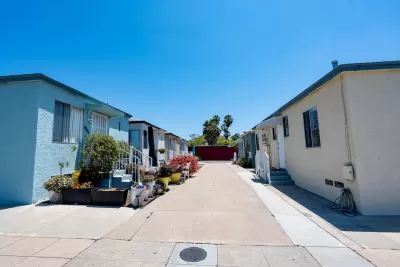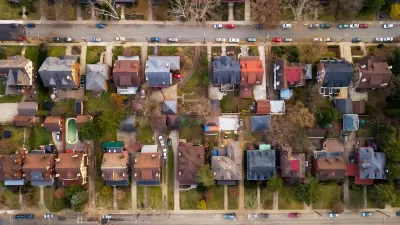Homeowners in Southern California are starting to take advantage of a state law that allows lot splitting and higher density in residential areas in an effort to increase housing supply and affordability.

Three years after a law allowing lot splitting was passed in California, San Diego is starting to see its effects as homeowners sell off or build on previously unused parts of their properties.
According to a KPBS article by Andrew Bowen, “SB 9, or the California HOME Act, allows homeowners to split their lots in two and build up to two homes on each parcel — even if local zoning restricts the property to a single detached house.”
The bill’s passage in 2021 was considered a victory for housing advocates who want to lower barriers to building more housing, but cities and homeowner groups continue to fight the law in courts and through more creative means.
“It does take a while for the general public to know about the law, and for planning departments to adjust to state laws,” says Muhammad Alameldin, a policy associate at UC Berkeley's Terner Center for Housing Innovation. For the law to make an impact on the housing supply, builders who specialize in small-scale infill can help homeowners understand the process and access resources to lower the costs of construction, Bowen writes. Cities including Sacramento and Los Angeles are also working to eliminate barriers and reduce costs for homeowners in other ways, such as issuing pre-approved plans for accessory dwelling units (ADUs).
FULL STORY: Three years into California duplex law, San Diego homeowners start to cash in

Alabama: Trump Terminates Settlements for Black Communities Harmed By Raw Sewage
Trump deemed the landmark civil rights agreement “illegal DEI and environmental justice policy.”

Study: Maui’s Plan to Convert Vacation Rentals to Long-Term Housing Could Cause Nearly $1 Billion Economic Loss
The plan would reduce visitor accommodation by 25% resulting in 1,900 jobs lost.

Planetizen Federal Action Tracker
A weekly monitor of how Trump’s orders and actions are impacting planners and planning in America.

Study Links Covid and Poor Driving
The effects of the virus, including ‘brain fog,’ can make driving more difficult and dangerous.

Waymo Gets Permission to Map SF’s Market Street
If allowed to operate on the traffic-restricted street, Waymo’s autonomous taxis would have a leg up over ride-hailing competitors — and counter the city’s efforts to grow bike and pedestrian on the thoroughfare.

Parklet Symposium Highlights the Success of Shared Spaces
Parklets got a boost during the Covid-19 pandemic, when the concept was translated to outdoor dining programs that offered restaurants a lifeline during the shutdown.
Urban Design for Planners 1: Software Tools
This six-course series explores essential urban design concepts using open source software and equips planners with the tools they need to participate fully in the urban design process.
Planning for Universal Design
Learn the tools for implementing Universal Design in planning regulations.
Caltrans
Smith Gee Studio
Institute for Housing and Urban Development Studies (IHS)
City of Grandview
Harvard GSD Executive Education
Toledo-Lucas County Plan Commissions
Salt Lake City
NYU Wagner Graduate School of Public Service





























